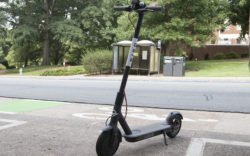Cooperative neighborhood gardens seem to be succeeding in Athens. Athens Land Trust has helped start at least eight such gardens—at churches, apartments, public housing, Pinewood Mobile Home Park, the Garnett Ridge neighborhood and the Community Council on Aging—and more are planned, says ALT director Heather Benham.
“People are going hungry in Athens,” she told Flagpole. “You pay your rent, but you may not have enough money to keep food on the table.” With a USDA grant and local money from the Junior League of Athens, ALT pays three garden staffers who supplement the organization’s affordable housing efforts by teaching people to grow their own food.
Several of the gardens have endured for years already—some older residents who have gardened before, but perhaps lack a place to put a garden, are “really excited,” Benham said. At Pinewood, “mostly what happens is the kids are the ones that garden.” Some church pastors see fresh vegetables as an answer to health problems in their congregations. A garden at Hill Chapel Baptist Church has been so successful that vegetables are being distributed weekly to needy church members.
Eggplants, squash and okra have been successful crops, Benham said, and “a lot of the gardens have greens right now.” Some people are only interested enough to “come in and pick other people’s produce,” she said, but “everyone’s welcome to get involved.”
People are surprised that fresh organic produce “tastes so much different” from supermarket produce, she said. There are monthly meetings where gardeners talk about methods. At the Council on Aging, wheelchair-accessible raised beds have been installed in a former parking lot. The land trust hopes to develop “market gardens” from which experienced gardeners can sell produce to supplement their incomes, but sales stands can be illegal under Athens-Clarke County regulations, and several county commissioners are asking for those to be reconsidered.
Anyone can start a home garden in a residential zone—front-yard or backyard, tall corn or compost, no regulations apply—but livestock is a different question, Bruce Lonnee of ACC’s planning department told Flagpole. Commissioners have occasionally mentioned making it legal to keep a few chickens—or rabbits? Or a goat?—but have never formally addressed it. Some cities do allow backyard livestock with few apparent problems.
“It works all over the place,” Lonnee said, if ordinances are carefully written so the animals are properly managed. But it’s illegal in Athens-Clarke, even if people call them their “pets,” Lonnee said. Keeping bees is illegal, too, he added. “You’d be surprised how many phone calls we get about beekeeping.” And the regs are enforced. “People have had to remove the animals,” he said, “or they’ve had to take down a food stand or remove a hive.”
Like what you just read? Support Flagpole by making a donation today. Every dollar you give helps fund our ongoing mission to provide Athens with quality, independent journalism.









